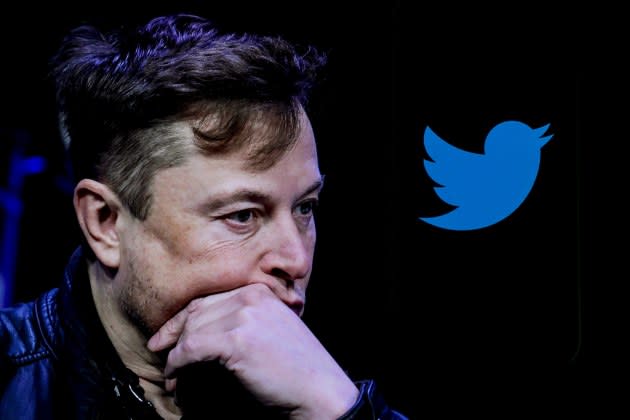Free Speech Champion Elon Musk Bans Jet Tracker, Vows ‘Legal Action’
- Oops!Something went wrong.Please try again later.

Programmer Jack Sweeney originally created the Twitter bot “@ElonJet” because he was a fan of Elon Musk. The success of @ElonJet prompted him to begin tracking other celebrity aircraft through the use of publicly available, open-source aviation data. Drake, Mark Cuban, Jeff Bezos, Taylor Swift, and Russian oligarchs all got the Jack Sweeney @CelebJets treatment.
On Wednesday, @ElonJet was permanently suspended from Twitter, despite Musk previously writing that he would leave the account up to demonstrate his commitment to free speech. Later on Wednesday, Sweeney himself was suspended, and revealed to The New York Times that around 30 of his accounts that tracked flight information — ranging from celebrities to NASA — were also banned. Sweeney said he was told that his accounts had violated rules against platform manipulation and spam.
More from Rolling Stone
By Wednesday evening, Musk revealed a very different reason for removing Sweeney from the platform. He characterized the tracking of aircraft as a form of “doxxing” and stated that Twitter’s content moderation policies would remove “any account doxxing real-time location info.” Exceptions would be made if the location information was posted on a delay, he said.
Any account doxxing real-time location info of anyone will be suspended, as it is a physical safety violation. This includes posting links to sites with real-time location info.
Posting locations someone traveled to on a slightly delayed basis isn’t a safety problem, so is ok.— Elon Musk (@elonmusk) December 15, 2022
While Musk has yet to produce any evidence linking Sweeney to threats against his family, he tweeted that a car carrying his son, X Æ A-12, had been “followed by [a] crazy stalker” in Los Angeles. “Legal action is being taken against Sweeney & organizations who supported harm to my family,” Musk posted before sharing a video of what appeared to be the alleged stalker’s license plate, and asking for help from followers in tracking down the individual.
The suspensions and frantic revisions to Twitter’s terms of service come days after Sweeney posted, from his personal account, a screenshot of an internal Twitter message provided to him by an anonymous employee who informed him that as of Dec. 2, @ElonJet had had its “visibility limited/restricted to a severe degree internally.” The internal message, from newly minted head of trust and safety Ella Irwin, read: “Team please apply heavy VF to @elonjet immediately,” VF meaning “visibility filter.”
Sweeney wrote to followers that the account was “search banned” and that it had been having visibility issues “for months now way before [Elon’s] takeover.” The shadowban was reportedly lifted a day before the account was booted from Twitter.
The screenshot of Irwin’s Slack message message is no longer visible following Sweeney’s suspension on Tuesday, which came hours after he tweeted about the suspension of the @ElonJets account. Twitter has apparently also begun restricting users’ ability to tweet links to the @ElonJets Instagram account.
Via Slack preview, the tweet from (now suspended) Jack Sweeney reportedly showing an internal Twitter message from Musk's new Trust & Safety head Ella Irwin requesting his account be placed under a visibility filter. pic.twitter.com/sMUP6U91gq
— nikki mccann ramírez (@NikkiMcR) December 14, 2022
The suspension is not surprising considering Musk’s previous attempts to persuade Sweeney to remove the account, and his reported affinity for booting accounts who annoy him now that he’s holding the reins of Twitter. It appeared @ElonJet might have been safe, though, Musk tweeted in November that his commitment to free speech was so sincere he would not ban “the account following my plane, even though that is a direct personal safety risk.”
How is anyone still taking any of this seriously? pic.twitter.com/6nbdUC57bM
— Sam Biddle (@samfbiddle) December 14, 2022
In November of last year, Musk reached out to Sweeney and requested he take down the account, citing security concerns. When Sweeney refused, Musk offered him $5,000 (far less than the going rate for a horse). Sweeney countered that he would remove the account for $50,000 or a new Tesla, and then an internship after Musk rejected his bargaining. Musk ultimately blocked him.
Musk’s takeover of Twitter was heralded by his fans as a renaissance for free speech on the platform, a depiction Musk was happy to lean into. But the reality of Musk’s content moderation revamp has been defined by the billionaire exercising his own petty grievances with the platform and its users, and the obliteration of tools and teams that worked to make Twitter a safer place. Musk recently authorized the release of a multi-part “Twitter Files” series in order to “expose” Twitter’s internal content moderation practices. Irvin, the new head of trust and safety, indicated on Twitter that she had provided photos showing internal restrictions placed on certain conservative accounts accused of violating content moderation policies by Twitter to writer Bari Weiss.
Despite their participation in the public condemnation of the use of back-end moderation tools, in the case of @ElonJet, it seems Musk’s new head of enforcement is happy to wield those same powers.
Sweeney did not immediately respond to a request from Rolling Stone for comment.
Best of Rolling Stone
